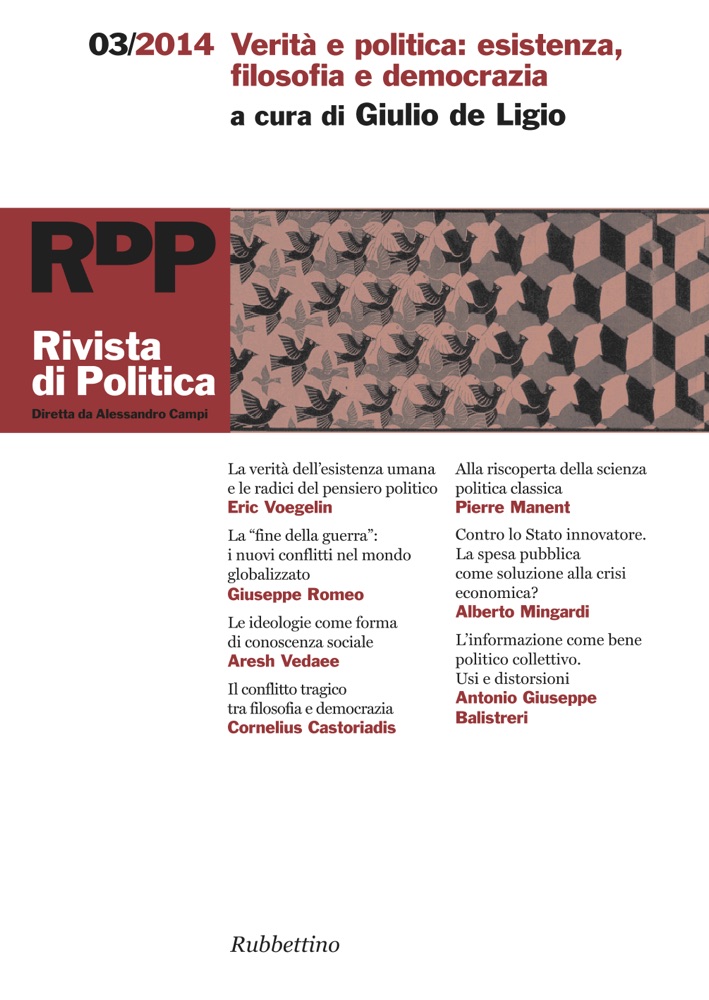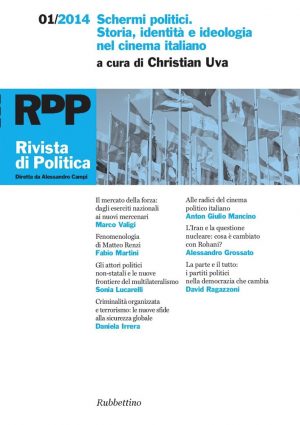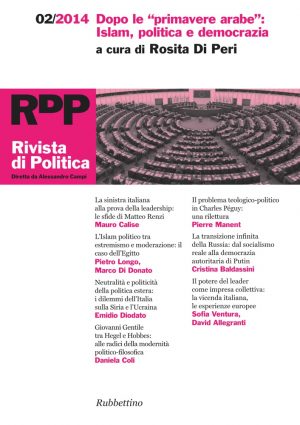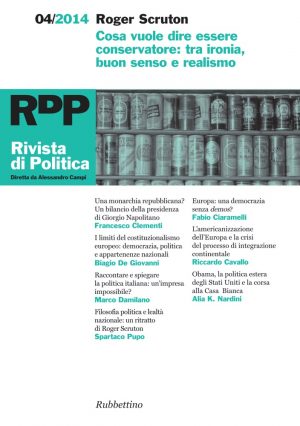03/2014 – Verità e politica: esistenza, filosofia e democrazia. A cura di Giulio de Ligio
ISSN: 2037-495X
8,50€ – 11,00€
Descrizione
Sommario:
congetture e confutazioni
Better Together: il referendum scozzese e la preferenza per il Regno Unito Claudio Martinelli
L’IS e l’Iraq: il crollo della statualità e le scelte contradditorie degli Stati Uniti Andrea Beccaro
Se l’Europa ha perso il “motore politico” francese Michele Marchi
Per un bilancio del berlusconismo (guardando all’oggi) Maurizio Griffo
La democrazia e i suoi equivoci (interpreti) Danio Breschi
A cento anni dalla “Settimana Rossa” tra ricostruzione storica e immaginario noir Emilia Musumeci
dossier: verità e politica
La verità come questione fondamentale e come problema politico Giulio De Ligio
La verità della politica. Filosofia e democrazia in Cornelius Castoriadis Francesco Callegaro
Il pensiero politico. Il conflitto tragico tra filosofia e democrazia Cornelius Castoriadis
Verità dell’esistenza e politica in Eric Voegelin Umberto Lodovici
Sul dibattito e l’esistenza Eric Voegelin
L’uomo di scienza e il politico. Per una filosofia pratica Pierre Manent
saggi
Polemiche ideologiche Aresh Vedaee
L’informazione: effetti perversi di un bene politico Antonio Giuseppe Balistreri
osservatorio internazionale
Piccole guerre e grandi strategie Giuseppe Romeo
analisi e discussioni
La crisi, l’innovazione e lo Stato. Su due libri di Mazzucato e Phelps Alberto Mingardi
Abstracts
Giulio De Ligio, Truth as a Fundamental Question and a Political Problem
Even if we hesitate when naming it, “truth” remains man’s most important question. Our scepticism concerning “great words” leads us to sharply separate this question from the debates and the actions of the city, or to consider the democratic plurality of values as being its solution. However, we still have to determine the criteria, forms and limits of our common lives. Therefore, truth is also one of the terms of the political problem. The continuation of the dialectics between the city and the truth – what we might hold as being Europe or the West’s main task – also requires, today, understanding the arguments, or the “moods”, which prevent us from recognizing that dialectics in the world, and therefore seeing, within human affairs themselves, those primary questions and common deliberations which characterize them. This essay outlines some elements of this inquiry and introduces a debate dedicated to “politics and truth” including reflections by Eric Voegelin, Cornelius Castoriadis and Pierre Manent.
Francesco Callegaro, The Truth of Politics: Philosophy and Democracy in Cornelius Castoriadis
The philosophy of Cornelius Castoriadis aims at developing an entirely new political thought, capable of recognizing and promoting the autonomy and higher value of democracy, thus freeing political practice from the constraints that political philosophy has always tried to impose on it by subjecting the reasoned confrontation of opinions to the ideal of the search for truth. The purpose of this article is to reconstruct the conditions, the meaning and the limits of such a political thought, conceived as a subversion of traditional political philosophy.
Cornelius Castoriadis, The political thought: The tragic Conflict Between Philosophy and Democracy
In this significant and provocative text, Castoriadis presents the guiding lines of his interpretation of the Greek origins of democracy and philosophy, defining at the same time the main ideas animating his new political philosophy: the abyssal ontology, based on the recognition of the radical indeterminacy of being; the central role of imaginary significations, those creations of society that transform chaos in a meaningful world; the heteronomy of archaic and traditional societies, which hide their self-instituting power by basing their social norms on an imagined extra-social source; finally, the project of autonomy, whose first and incomplete expression dates back to Ancient Greece and to the opening of the radical questioning of opinions and laws, embodied in the conflicting relation between philosophy and democracy.
Umberto Lodovici, Truth of Existence and Politics in Eric Voegelin
This paper investigates Voegelin’s essay On Debate and Existence and places it within the intellectual journey of its author, whose search of a philosophical anthropology and of an adequate theory of myth provides the premises of his interpretation of the political phenomenon. Voegelin believes that a political community is structured through the representation it makes of its own truth. It is only, however, on the basis of a truth that corresponds to the real existence of the human being that Voegelin sees the possibility of a society that respects the order of the authentic human condition. According to Voegelin, totalitarianisms and contemporary ideologies are attempts to escape from reality. Therefore, they give up the critical sense in order to build a fictive world where secular realities are re-sacralised.
Eric Voegelin, On Debate and Existence
On Debate and Existence is an important step in the development of the philosophy of consciousness and existence, and engages Voegelin while he was working at his most important opus, that is, Order and History. The essay focuses on the debate around the notion of truth, complicated by modern ideologies. Starting from St. Thomas and Aristotle’s metaphysics, Voegelin intends to go beyond their antiquated language in order to reach and preserve the core of their discussion. He shows that in their philosophy lays the principle of the fundamental experience of human condition as contingent reality, dependent on transcendence. Only relying on this common existential premise, an authentic communication between people is achievable.
Pierre Manent, The Scientific Man and the Political: Towards a Practical Philosophy
In this lecture delivered on the occasion of his retirement from teaching at the EHESS, Manent outlines the main features, the strongest arguments and the abiding relevance of the practical philosophy, or political science, first elaborated by Aristotle. Following the latter, he reminds us that there are human things which depend on human beings. Practical philosophy is that scientific approach which is the most capable of understanding those things and, therefore, of guiding human action and deliberation. To understand that founding presupposition also means recognizing those elements which have shaped European history and that might still be capable of orienting political societies and human life. The Christian proposition has modified the practical attitude of Europeans and the relation between politics and religion while never being able to govern societies. There is no such a thing as a Christian “political theology”. Human beings and European nations still need to act, deliberate, and govern themselves. They still have to find the best matching of words and actions, or the best practical composition of the cardinal virtues: courage, moderation, justice, and prudence. They still need to reflect on the tension between political and Christian virtues rather than saying farewell to Aristotle and the Gospels. The declaration of “values” is not enough, since it does not allow for action in the fullest meaning of the term. History and the alleged necessities of globalization cannot determine the deliberations of political bodies, nor can they define the most important goods of human beings. That is why practical philosophy, or political science, remains the most important of all human sciences.
Aresh Vedaee, Ideological Controversies
The main purpose of this article is to clarify the underlying reasons of those attitudes commonly named “ideological beliefs”. When we speak of “ideology” we mainly refer to the set of beliefs about the principles of social organization, according to the interests of given group, and promoted by certain rhetorical strategies. Often, however, this notion is loaded with a negative connotation because it deems that ideological beliefs typically occur when the individual capacity of fair judgment has been severely compromised (as opposed to scientists’ impartial judgments), to the point of overlapping with dishonest or fanatic behaviours. However, this view is unsatisfactory because it implies that human knowledge must be seen as a function of individual cognitive performances, while in fact it is essentially the product of social information processing. From this simple observation follow some important consequences that we need to examine: the first one is that “ideological beliefs” consist in background beliefs regarding the production and distribution not only of material goods but also of knowledge. The second consequence is that science, as the most developed form of social information processing, requires these “ideological beliefs”, and for that reason it too should be considered “ideological”. And the third consequence is that such beliefs remain nonetheless problematic due to the combined effect of intrinsic opacity and corruptibility of social computing processes, more than to individual psychological deficiencies.
Giuseppe Antonio Balistreri, Information: Perverse Outcomes of a Political Good
Information plays an important role because political power and sovereignty are split. Information performs an intermediate function of communication between policy and citizenship. Social changes have made information increasingly politicized. But after the politicization of the media, came the mediatization of politics. Today politics suffers the inevitable rules of the adaptation to media. Information takes the form of entertainment and television becomes predominant. The intent of the television reflects the contradictions of media democracy. The majority of the public decides only on the basis of the appearance, not with reference to political contents. More recently there has been an uncommon inversion, by means of which the information system tends to replace reality and offers no-news and pseudo-events. In particular, the political information news replace facts.
Giuseppe Romeo, Small Wars and Great Strategies
Finding a coherent international relationship system, one in which we might find regular behaviours between actors, is a difficult task. It does not matter if we consider great powers (like Russia, China and USA) or medium/small regional powers. Today, the western community understands the impossibility of an unilaterally imposed order – i.e. the order of the strongest one. The end of classic warfare and a new concept of asymmetrical conflict change the role of war itself as well as its political meaning. New wars or “wars between people”, “4th generation wars” or “war without restrictions” are all aspects of the hybrid war. A new concept concerning the use of force that transcends any unilateral vision about power politics. In this scenario, a unique principle can be an idea for the future: to transform operating strategies, tactics and political choices.
Alberto Mingardi, Crisis, Innovation, Government: On two Books by Mazzucato and Phelps
What makes for an innovative society? The relevance of this question is obvious as our societies are struggling to exit a deep economic crisis. Mariana Mazzucato (in her book The Entrepreneurial State) and Edmund Phelps (in his book Mass Flourishing) trace innovation back to two very different sources: widespread government intervention on the one hand, and culture on the other. This paper reviews Mazzucato’s thesis and finds it unpersuasive. The evidence she provides does not seem to support the idea that governments can pick winners of the competitive game. Innovation in society is more likely to be the outcome of a complex processes, rather than of industrial policies alone.






